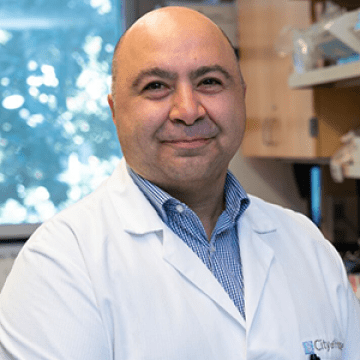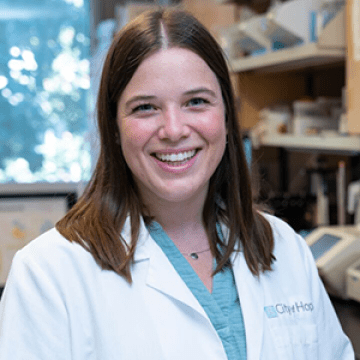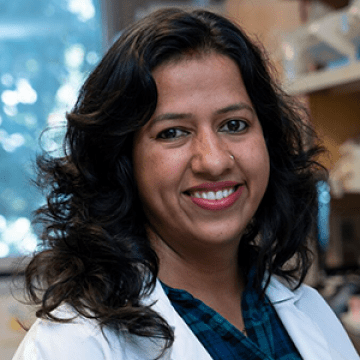Joshua Tompkins, Ph.D.

Joshua Tompkins, Ph.D., is an associate research professor in City of Hope’s Department of Diabetes Complications & Metabolism. His research focuses on epigenome manipulation in human pluripotent stem cells and entire model organisms.
Major projects include:
- Epigenetic DNA methylation editing, with an emphasis on stem cell and heritable forms of epigenome engineering.
- Detection and correction of epigenetic sites of long-term diabetes complications.
- Epigenomic mapping of pluripotent cell fate.
- The use of innovative systemic aging interventions to mitigate diabetes complications.
Prior to his work with long-standing mentor Arthur Riggs, Ph.D. at City of Hope®, Dr. Tompkins received his postdoctoral fellowship from the California Institute of Regenerative Medicine (CIRM). The resulting collaborative work helped lead to the scalable expansion of epigenetically stable human pluripotent stem cells and derived cell products in xeno-free and fully defined cultures under good manufacturing practices. During this time, Dr. Tompkins also taught genetics and cellular and molecular biology courses at California Polytechnic University, promoting student interest in biomedical life sciences, including those who chose to start their careers at City of Hope. Previously, he has taught courses in biochemistry (Washington State University) and biology (WSU) and co-taught ethical issues in stem cell medicine (City of Hope). He has successfully mentored and co-mentored numerous undergraduate, graduate and postdoctoral students. Dr. Tompkins received his Ph.D. in molecular biosciences from Washington State University, where he was an ARCS (Achievement Reward for College Scientists) fellow in the Center for Reproductive Biology. At WSU, his work centered on understanding how cancer cells utilize meiotic proteins and specialized DNA recombination to repair several forms of DNA damage, including ionizing radiation, chemotherapeutics, and individual researcher-defined DNA breaks.
Dr. Tompkins has published and peer-reviewed several high-impact journals, including the Proceedings of the National Academy of Sciences, the Journal of Clinical Investigation, Circulation and Nature Metabolism, and is a long-time member of the International Society of Stem Cell Researchers. His research is highly creative and multidisciplinary and involves several on- and off-campus collaborations to understand and correct epigenomic drivers of aging, cancer, diabetes, and associated long-term complications. Dr. Tompkins leads an active and energetic research team, and he is also co-administrator of City of Hope’s basketball league.
Duarte Cancer Center
Duarte, CA 91010
2009, Ph.D., School of Molecular Biosciences, Washington State University, Pullman, Washington
2004, B.S., in Biology, Minor in Chemistry, Southern Oregon University, Ashland, Oregon
2009-2014, California Institute for Regenerative Medicine (CIRM) Fellow, Beckman Research Institute of City of Hope, Duarte, California. Mentor: Arthur Riggs, Ph.D.
2004-2009, ARCS Fellow, School of Molecular Biosciences and Center for Reproductive Biology, Washington State University, Pullman, Washington
2019-present, Associate Research Professor, Department of Diabetes Complications & Metabolism, Arthur Riggs Diabetes & Metabolism Research Institute at City of Hope, Duarte, California
2023-present, Advisor, Diabetes Guardians, LLC.
2014-2019, Assistant Research Professor, Department of Diabetes Complications & Metabolism, Arthur Riggs Diabetes & Metabolism Research Institute at City of Hope, Duarte, California
2011-2014, Lecturer, Department of Biological Sciences, California Polytechnic University, Pomona, California
The Tompkins team represents a direct continuation of several core research projects initiated alongside Arthur Riggs, PhD., before his untimely passing in 2022. Major works include 1) epigenetic DNA methylation engineering, with special emphasis on stem cell and heritable forms of epigenome engineering, 2) detection and correction of epigenetic sites of long-term diabetes complications, 3) epigenomic mapping of pluripotent derived cell products, and 4) the use of innovative systemic aging interventions to mitigate diabetes complications. His team is studying how DNA methylation is correlated with cell fate, aging, diabetes and its complications, as is investigating strategies to reverse epigenetic events associated with these processes.
Aging and virtually all human diseases involve dysregulation of the epigenome. Our research involves fundamental inquiry into epigenetic features of diabetes, cancer, and cardiovascular disease, seeking to understand which intrinsic features are correlated with aging or disease progression, and which are therapeutically reversible.
Toward this goal, we are actively working on multiple interrelated projects spanning:
- The study of epigenetic “memories” and targeted reversal in long-term diabetes complications
- The development of techniques for programming heritable DNA methylation to model human epigenetic aging and disease
- The use of pluripotent stem cells and directed to differentiation to model diabetic disease and for cell replacement-based medicine
- The application of age-augmenting therapeutic blood exchanges to alleviate diabetic complications
DNA Methylation Engineering and Directed Differentiation
DNA methylation enables development and functions as a known regulator of transcription and repetitive element activity. A covalent DNA modification that occurs predominately at cytosine, DNA methylation represents a highly specific disease- and age-specific biomarker. Its deposition unfolds with such remarkable predictability that several epigenetic “clocks” can now accurately predict the biological age of an individual based on specific patterns of CpG DNA methylation. Enzymatically written, DNA methylation is erased genome-wide between generations and in primordial germ cells and the early stages of pre-implantation development, enabling a genomic reset between parent and child. There is strong evidence that rare imprinting sites escape this erasure and influence embryonic development and future disease. There is also evidence that some environmentally induced DNA methylation changes are transgenerationally retained and influence human disease propensity across generations. To investigate and correct, we have developed techniques to pattern-stable, site-specific DNA methylation, faithfully programmed with each ensuing generation. Both in vitro and in vivo, CpG Island Methylation Responses (CIMRs) are specific genome-wide, enduring, influence cell fate, and specified de novo DNA methylation is heritable in virtually all tissues. As City of Hope is both a diabetes and cancer research center, designer DNA methylation targets epigenetic obesity, cardiovascular disease, and cancer murine model building and strategies to remove pathological sites of DNA methylation. We specialize in the dCas-based epigenetic editing tool development and the directed differentiation of multiple lineages for modeling and cell replacement medicine, with expertise in cardiomyocyte and thymic epithelial cell production.
Epigenetic Memories
Differentiation requires DNA methylation, and we have previously observed human pluripotent stem cell differentiation marked by dynamic changes to the epigenome and genome-wide DNA methylation. By mapping these epigenetic changes over time, we have uncovered several examples of epigenetic “memory,” in which transcriptional history is recorded onto DNA. In some cases, this may be functional, and in others, this may be pathological. For example, our collaborator Rama Natarajan, Ph.D., through a series of landmark studies, has identified that a period of poor glucose management can result in future long-term health complications, both microvascular and macrovascular, which involve multiple organ systems. Remarkably, health complications from type I diabetes may be predicted decades before their emergence by specific sites of DNA methylation change. As a functional recording of prior hyperglycemia, sites of “metabolic memory” are stably altered across the genome, and these accelerate an individual’s propensity to develop vascular disease, retinopathy, and nephropathy. Beyond biomarker detection, we are developing tools that enable the induction and erasure of pathological DNA methylation, with specialized delivery approaches to target specific types of pluripotent and multipotent stem cell populations capable of carrying DNA methylation edits through development. These approaches are aimed at functionally erasing novel and established biomarkers of diabetes complications.
Therapeutic Blood Exchanges
Since the first systemic plasma depletion experiments, and more contemporaneously through young-old murine parabiosis study, physicians and scientists have observed systemic benefits imparted by whole blood exchange and pheresis therapies. The latter is known to be particularly effective in alleviating severe autoimmune attacks and in treating familial hypercholesterol syndromes, blood cancers, neurological conditions, and kidney disease, among others. Yet, due to small blood vessels and the complexities of conducting blood exchanges in murine models, therapeutic blood exchange work in mice has been extremely limited. To overcome this hurdle, we have developed a semi-automated blood exchange approach for conducting therapeutic blood exchanges between aged and young mice. The approach imparts significant tissue regenerative benefits to aged recipient mice, including skeletal muscle, liver, and vascular improvements and the reduction of biological age by predictive DNA methylation patterning. Currently, we are using this model system to inform translational blood exchange interventions that may mitigate diabetes and its complications in humans, especially vascular complications, and to investigate the depletion of circulating small extracellular vesicles, which may drive disease.
Funding for these projects comes from a network of collaborators and core services at City of Hope and the Translational Genomics Research Institute, such as the generous support of Dr. Riggs and his family. The Wanek Family Project for Type 1 Diabetes at City of Hope and the Dorrance family project on extracellular vesicles at Translational Genomics offer partial support for research on metabolic memory and extracellular vesicles.
Learn more about the Tompkins Lab and related research at Epigenome Engineering.


Therapeutic blood exchanges and stem cell DNA methylation editing




Lab Alumni
Former Research Associates
- Elizabeth Lizhar, M.S.
- Swetha Godatha, M.S.
- Jordan Berley, M.S., PharmD
- Diba Kamali, M.S.
- Anand Upadhyaya, M.D.
Former Co-Mentored Students
- Jonas Cerneckis, B.S.
- Pratibha Mishra, Ph.D.
- Jonathon Wise, Ph.D.
2008, Wiley Research Exposition Award, Washington State University, Pullman, Washington
2008, Robert A. Nilan Travel Grant, Washington State University, Pullman, Washington
2007-2008, Cancer Research and Prevention Center Scholarship, Washington State University, Pullman, Washington
2004-2007 , Achievement Reward for College Scientist (ARCS) Fellowship, ARCS-Seattle Chapter
2004, Honors Capstone, Southern Oregon University, Ashland, Oregon
2003, Blanch Plunkett Memorial Scholarship, Southern Oregon University, Ashland, Oregon
2003, Robertson R. Robinson Memorial Scholarship, Southern Oregon University, Ashland, Oregon
2003, W.M. Smullin Trust Scholarship, Southern Oregon University, Ashland, Oregon
2000, Josephine County Medical Association Scholarship
American Society of Human Genetics
International Society for Stem Cell Research
- Tompkins JD. Transgenerational Epigenetic DNA Methylation Editing and Human Disease. Biomolecules. 2023 Nov 22;13(12):1684. doi: 10.3390/biom13121684. PMID: 38136557.
- Li Q, Wang X, Song Q, Yang S, Wu X, Yang D, Marie I, Qin, H, Zheng M, Nasri U, Kong X, Wang B, Lizhar E, Cassady K, Tompkins JD, Martin PJ, Zhang Xi, Zeng D. Donor T cell STAT3 deficiency enables tissue PD-L1-dependent prevention of GVHD while preserving GVL activity. Journal of Clinical Investigation. 2023 Aug 1; 133(15): e165723. PMID: 37526084
- Tompkins JD, Lizhar E, Shokrani A, Wu X, Berley J, Kamali D, Hussey D, Cerneckis J, Kang TH, Wang J, Tsark W, Zeng D, Godatha S, Natarajan R, Riggs AD. Engineering CpG island methylation in pluripotent cells through synthetic CpG-free ssDNA insertion. Cell Reports Meth. 2023 May; 10.1016/j.crmeth.2023.100465
- Tompkins JD. Discovering DNA Methylation, the History and Future of the Writing on DNA. Journal of the History of Biology. 2022 Dec;55(4):865-887. doi: 10.1007/s10739-022-09691-8.
- Mishra, P. Lizhar EM, Hussey D, Shokrani A, Cerneckis J, Wang Jinhui, Wu Xiwei, Riggs AD, Tompkins JD. Human pluripotent stem cell and cardiomyocyte derived extracellular vesicles mediate cardiac regeneration in high glucose induced cardiac damage. International Society for Stem Cell Research Annual Meeting. San Francisco, CA. June 15th-18, 2022.
- Hussey D, Shokrani A, Lizhar EM, Tsark W, Xu Xiwei, Kang TH, Riggs AD, Tompkins JD. Targeted insertion of CpG-free ssDNA induces heritable CG Island Methylation Response (CIMR) in mice. International Society for Stem Cell Research Annual Meeting. San Francisco, CA. June 15th-18, 2022.
- Lizhar EM, Berley J, Hussey D, Kamali D, Mishra P, Guo Chao, Tae-Hyuk Kang, Wu Xiwei, Riggs AD, Tompkins, JD. CpG-free insertion-based CGI Methylation Response (CIMR) is restricted to primed pluripotency. International Society for Stem Cell Research Annual Meeting San Francisco, CA. June 15th-18, 2022.
- Zhuo C, Miao F, Braffett BH, Lachin JM, Zhang L, Wu X, Roshandel D, Carless M, Li Xuejun, Tompkins JD, Kaddis JS, Riggs AD, Paterson AD, DCCT/EDIC Study Group, Natarajan R. DNA methylation: a mediator of HbA1cassociated complications development in Type 1 diabetes. Nature Metabolism. 2020 Aug;2(8):744-62. PMID: 32694834; PMCID: PMC7590966
- Tompkins JD. Targeted methylation for epigenomic editing of ESCs. Stem Cell Engineering for Therapeutic Applications. International Society for Stem Cell Research Annual Meeting. Los Angeles, CA. June 25-28, 2019. Invited speaker.
- Awasthi S, Tompkins JD, Singhal J, Riggs AD, Yadav S, Wu X, Warden C, Lui Z, Wang J, Slavin TP, Weitzel JN, Yuan YC, Awasthi YC, Singhal SS. Rlip depletion prevents spontaneous neoplasia in TP53 null mice. Proc Natl Acad Sci U S A. 2018 Apr 10;115(15):3918-3923. doi: 10.1073/pnas.1719586115. Epub 2018 Mar 23
- Chen Z, Miao F, Paterson AD, Lachin JM, Zhang L, Schones DE, Wu X, Wang J, Tompkins JD, Genuth S, Braffett BH, Riggs AD; DCCT/EDIC Research Group, Natarajan R. Epigenomic profiling reveals an association between persistence of DNA methylation and metabolic memory in DCCT/EDIC type 1 diabetes cohort. Proc Natl Acad Sci U S A. 2016 May 24;113(21):E3002-11. doi: 10.1073/pnas.1603712113. PMID: 27162351
- Tompkins JD, Jung M, Chen C, Lin Z, Ye J, Godatha S, Hsu D, Couture LA, Riggs AD. Mapping Human Pluripotent-to-Cardiomyocyte Differentiation: Methylomes, Transcriptomes, and Exon DNA Methylation “Memories.” EbioMedicine. Jan. 19th, 2016. doi:10.1016/j.ebiom.2016.01.021.
- Figarola JL, Singhal J, Tompkins JD, Rogers G, Warden C, Horne D, Riggs AD, Awasthi S, Singhal S. SR4 uncouples mitochondrial oxidative phosphorylation, modulates AMPK-mTOR signaling, and inhibits proliferation of HepG2 hepatocarcinoma cells. J Biol Chem. 2015 Dec 18;290(51):30321-41. doi: 10.1074/jbc.M115.686352
- Warden CD, Lee Heehyoung, Tompkins JD, Li Xiaojin, Wang C, Riggs AD, Jove R, Yuan Y-C. COHCAP: An Integrative Genomic Pipeline for Single-Nucleotide Resolution DNA Methylation Analysis. Nucleic Acids Res. 2013 Jun;41(11):e117. doi: 10.1093/nar/gkt242. Epub 2013 Apr 17. PMID 235989999
- Tompkins JD, Knoblauch C, Chang-yi Chen V, Hsu D, Couture L, Riggs AD. Epigenetic Stability, Adaptability, and Reversibility in Human Embryonic Stem Cells. Proc Natl Acad Sci U S A. 2012 Jul 16. PMID: 22802633
Dr. Tompkins additional publications click here.